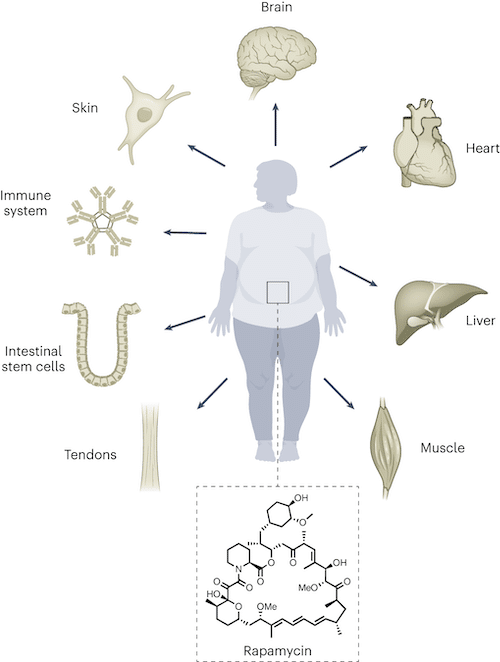Can You Age Better with Rapamycin?

Can You Age Better with Rapamycin? Quick answer: (1) Yes, for animals tested; (2) Don’t know for the human animal — although anecdotal evidence is promising, more research is needed. Bottom line: pay attention to rapamycin. Here’s why.

And there’s reason to look askance at the drug rapamycin, not only because of what seems to be oversized claims that you can age better by taking it, or even reverse aging, but because it was designed to suppress the immune system so that it would not reject organ transplants.
Yeah, an organ transplant drug that’s supposed to help you age better. Sounds ridiculous right from the start, but the evidence is growing that rapamycin just might do as advertised — help you age better; meaning, slow down the rate of aging, or even reverse it.
But before you trot over to your doctor’s office and twist his arm to write you a script for rapamycin — which he or she is very unlikely to do, unless you just had a kidney transplant — read my forthcoming summaries of two videos on the subject.
Here’s what I’m going to cover:
- The rapamycin animal studies are persuasive
- Drs. Green and Kaeberlein reveal their rapamycin experiences (video)
- A forum to keep abreast of rapamycin developments
Let’s dig in…
Why the Attraction to Rapamycin?

Credit: Targeting the biology of aging with mTOR inhibitors https://www.nature.com/articles/s43587-023-00416-y
Simply put, numerous animal studies showed that rapamycin improves several important physiological functions and biochemical processes that lead to a healthier and slower pace of aging. Biohackers took note and started taking rapamycin to slow down aging. Then highly regarded professionals such as Alan Green, MD, Peter Attia, MD and Matt Kaerberlein, PhD, among others, divulged their use of rapamycin.
Given that the off-label use of rapamycin for life extension or aging better has not been studied in humans, why would these health professionals take such a leap?
I guess it’s animal studies.
Rapamycin has been scientifically studied in worms, flies, mice and dogs, at minimum. These studies support the claim that rapamycin is the only drug studied so far that inhibits the mTOR pathway, which has been identified as a key driver of aging and age-related diseases across species, and that reducing mTOR activity slows aging processes like inflammation, cardiovascular disease, and dementia.
The 2021 study Effect of rapamycin on aging and age-related diseases—past and future states:
“Over the past decade, there has been an explosion in the number of reports studying the effect of rapamycin on various diseases, physiological functions, and biochemical processes in mice. In this review, we focus on those areas in which there is strong evidence for rapamycin’s effect on aging and age-related diseases in mice, e.g., lifespan, cardiac disease/function, central nervous system, immune system, and cell senescence.”
The 2019 study mTOR as a central regulator of lifespan and aging states:
“Consistent with its role in coordinating protein synthesis, energy metabolism, and autophagy in cancer, emerging evidence suggests that mTOR may act as a central node that orchestrates many aspects of cellular and organismal biology related to aging phenotypes.”
The 2024 study Targeting ageing with rapamycin and its derivatives in humans: a systematic review states:
“At least five of 12 defined hallmarks of ageing are modulated by the mechanistic target of rapamycin (mTOR) pathway.”
(More about the Hallmarks of Aging)
The study also mentions that the mTOR pathway has been linked to multiple chronic disease processes like declining immune function, cardiovascular disease, neurodegeneration, and cancer
These are just three of multiple sources that support the claim that rapamycin inhibits the mTOR pathway, which research has identified as a key regulator of aging and age-related diseases across species, and that reducing mTOR activity can slow aging processes like inflammation, cardiovascular disease, and neurodegeneration/dementia.
Long time readers of this site may wonder why that, given how amazing rapamycin is, why haven’t I incessantly extolled its virtues here and in the Newsletter? Well, I did write one post about it, Rapamycin: A Lifespan Drug for Humans?, that touches on how it works, offers a cost/benefit review, and suggests safer alternatives.
But other than that one post, I’ve been quiet about rapamycin for two basic reasons:
- Despite the anecdotal evidence, rapamycin hasn’t been proven to be safe for humans in the context of promoting healthspan or lifespan; and
- It’s a drug for which you need a prescription that was made for organ transplant patients, not age biohackers.
Despite those two reasons, once I noted that very credible people that I trust (namely, Drs. Attia, Green and Kaeberlein, et al) are taking intermittent, low-dose amounts of rapamycin, my resistance has softened. Nonetheless, I have not convinced myself to take rapamycin, and I’m definitely not advocating it for you. What, however, I can do, is provide you with more information, and in that vein, what follows are two video about rapamycin, along with my summary of each
Drs. Green and Kaeberlien Weigh In On Rapamycin
- In the first video, Mike Mutzel from High Intensity Health interviews Alan Green, MD, purportedly the first medical doctor that routinely subscribes rapamycin to his patients, and takes it himself. This video will give you a solid background about rapamycin and mTOR.
- In the second video, gerontologist Matt Kaeberlein shares insights gleaned from his off-label rapamycin use.
After those two videos, I’ll tell you about a rapamycin news forum you can join.
My summary:
Understanding Aging and Deterioration
Aging is often equated with deterioration, but this concept is largely unique to terrestrial mammals. Unlike crocodiles or fish, which maintain vigor and dominance throughout their lives, humans experience progressive decline with age.
Aging is not merely a result of genetic deterioration. Instead, it’s driven by physical and chemical forces that govern inanimate objects, similar to the deterioration of an old car or shoe.
The Evolutionary Origins of Aging
Darwin recognized aging as a by-product of evolution. While beneficial traits are selectively retained, aging promotes the replacement of older individuals with those harboring newer genetic innovations. This process pushes evolution forward, encouraging the development of advantageous traits.
Rapamycin and MTor Inhibition
Mammalian target of rapamycin (mTOR) promotes growth and development in young animals. However, as we age, mTOR contributes to age-related diseases and the aging process itself.
Rapamycin, a drug originally used in transplant medicine, has been shown to inhibit mTOR. By suppressing mTOR, rapamycin has demonstrated positive effects in:
- Delaying aging
- Slowing the progression of age-related diseases
- Improving cognitive function
Benefits of Rapamycin for Athletic Performance
- Improved cardiac function: Rapamycin has been shown to slow age-associated decline in cardiac function, resulting in improved athletic performance.
- Enhanced fuel efficiency: Rapamycin shifts mitochondria toward burning high-octane fuel similar to younger individuals, increasing energy output.
- Increased aerobic capacity: Rapamycin improves maximum heart rate and cycling performance, indicating enhanced aerobic performance.
Targeting Rapamycin Treatment
Dr. Alan Green emphasizes treating diseases before irreversible structural damage occurs. Testing for conditions such as ApoE4 genotype and insulin resistance can help identify individuals who may benefit from early rapamycin treatment.
Administration and Dosage
Rapamycin is typically taken once a week. The optimal dosage may vary depending on body weight and genetic factors (e.g., presence of the APOE4 gene).
- For individuals with APOE4, it’s recommended to start at a dose of 6 milligrams per week around age 40.
- For those without APOE4, starting at age 40 to 50 seems appropriate.
Side Effects and Considerations
- Bacterial infections: Rapamycin can reduce the activity of the innate immune system, which increases susceptibility to bacterial infections. Patients should have an antibiotic on hand.
- Mouth sores: Gingivitis and periodontal disease can be reduced with rapamycin, but mouth sores can sometimes occur as a side effect.
Video Takeaway
Understanding that aging is a controllable process empowers us to take proactive measures. By targeting mTOR with rapamycin, we can potentially slow down aging, enhance cognitive function, and improve athletic performance. Further research is necessary to optimize dosage and monitor long-term effects.
Next up, Dr. Matt Kaeberlein:
My summary:
Kaeberlein’s Subjective Impacts from Rapamycin
- Perceived reduction in aches and pains during resistance training
- Easier to lose body fat in conjunction with dietary modifications
Weight Loss and Body Fat Changes
- Loss of 5 lbs in 8 weeks
- Weight loss exclusively from body fat (no lean mass loss)
- Potential for rapamycin to facilitate easier weight loss
Rapamycin Blood Levels
- Conducted an experiment to measure rapamycin levels in blood
- Half-life of rapamycin estimated at approximately 8 hours, significantly shorter than the reported 63 hours in the literature
- Similar results observed in the blood levels of another individual, suggesting that individuals may metabolize rapamycin more rapidly than expected
Bacterial Infection
- Developed a bacterial skin infection during the rapamycin cycle
- Suspected that the combination of a compromised skin barrier (due to improper CGM application) and exposure to bacteria from a dog’s skin infection contributed to the infection
- Rapamycin may have created a permissive physiological state for the infection
- Hard to determine a definitive causal link between rapamycin and the infection, but the timing raises suspicions
Video Takeaway
- Subjective and objective observations support the potential benefits and impacts of rapamycin in the areas of pain relief, weight management, and pharmacokinetics.
- The rapid metabolism of rapamycin in the author’s case highlights the need for further research and personalized dosing strategies.
- The bacterial infection experienced during the cycle serves as a reminder of the potential risks associated with off-label rapamycin use, although a definite causal link cannot be established.
More Info at Rapamycin News
Rapamycin News is a lodestone for rapamycin information, including the self-reported use and benefits reported by individuals experimenting with the drug.
You will be able to find just about anything related to rapamycin that pertains to aging better with rapamycin.
For instance, here are some recent posts on Rapamycin News:
I’ll leave you with this suggestion:
Don’t jump into the rapamycin pool before you gauge the depth of the water; meaning, study this long and hard. And do the most important stuff first, such as:
Those three things will pay you the greatest dividends.
Last Updated on May 19, 2024 by Joe Garma


